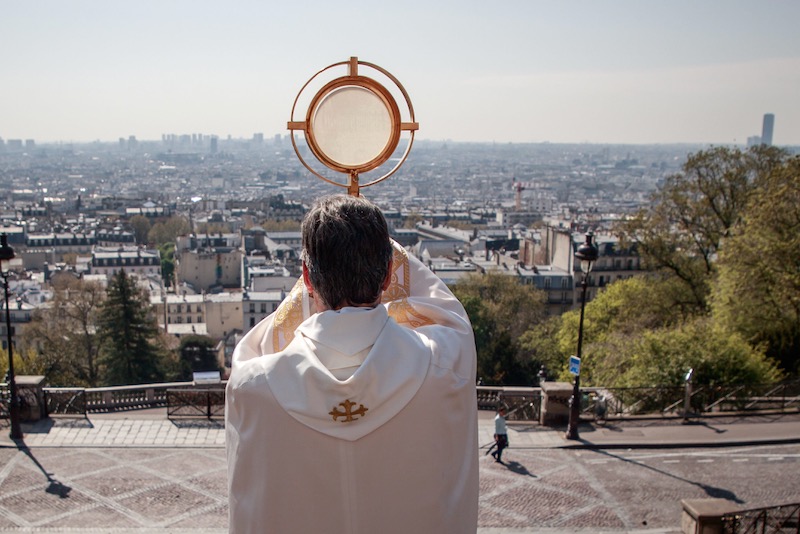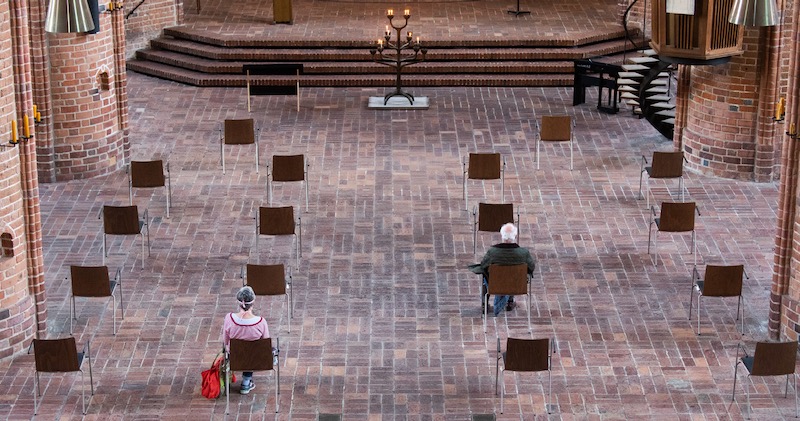Vietnam’s swift and decisive response to the pandemic has been applauded by the World Health Organisation. The country eased restrictions last week after its measures of mass quarantining, contact tracing, and banning flights from mainland China, helped it see just 268 virus cases and no deaths. Vietnamese clergy have supported self-isolation, with Catholics told not to attend Mass. Fr Anthony Nguyen Ngoc Ha, head of Caritas in Hue Archdiocese, said Caritas has supplied each parish with 500kgs of rice to help the many poor people, especially motorbike taxi drivers and street vendors, who have no jobs or income during strict lockdown.
Jakarta Catholic Archdiocese and Nahdlatul Ulama (NU), the largest moderate Islamic organisation in Indonesia, have teamed up to assist marginalised people affected by the coronavirus pandemic during Ramadan. Under the project “Your Ramadan, My Ramadan”, they are jointly distributing food packages every day for the next month as pre-dawn meals. Recipients are those who can no longer make a living during lockdown: the unemployed, homeless, disabled and elderly, as well as Islamic boarding schools and orphanages.
Pope Francis extended his Ramadan greetings to the Grand Imam of Al-Azhar in Egypt, Ahmad Al-Tayeb in a phone call on Friday. In February last year, Al-Tayeb and Francis signed the “Document on Human Fraternity for World Peace and Living Together” in the UAE to signal tolerance between the two religions.
Asked in an Instagram Q&A what he would do if he were Pope for a day, the Bishop of Osnabrück, Franz-Josef Bode, replied: “I would deal with the issue of women's ordination. I’d like to take up the discussion as to whether the arguments we have put forward up to now must not be re-examined.“
In a Letter for the month of May, published on 25 April, Pope Francis proposed two new prayers to the Blessed Virgin Mary, which can be recited at the end of the Rosary. “Mary Most Holy, stir our consciences, so that the enormous funds invested in developing and stockpiling arms will instead be spent on promoting effective research on how to prevent similar tragedies [to the coronavirus pandemic] from occurring in the future,” one of the prayers said. (See our Living Spirit section.)
Cardinal Patrick D'Rozario, Archbishop of Dhaka, has asked parishes, schools and other potential donors to contribute to the special fund called “Corona Charity Fund”. It is providing 650 Catholic families in Dhaka Archdiocese with money to buy food and the plan is to reach a further 1,500 families.
There is anger in Bangladesh over a government plan to allow some elite hospitals in the capital Dhaka to exclusively treat upper-class Covid-19 patients. Fr Anthony Sen, of the Catholic Bishops’ Justice and Peace Commission, said, “there should be no rich-poor consideration in treatment because it is a life-and-death situation”.
The Chaldean Patriarch, Cardinal Louis Raphael Sako, says the coronavirus pandemic is strengthening Islamic-Christian partnership. The Iraqi Church has donated $90,000 to parishes “that the priests used to help people, without distinction of religion”, he reported last week. Baghdad’s parish priests have also decided to donate their salaries to help the poor and the people most affected by the pandemic. Some mosques and Muslim families have assisted Christians. “In any neighbourhood, a richer person distributes food bags to the needy,” the Patriarch said. Congregations are following Mass every evening broadcast through the patriarchate’s social media site. “The houses have become domestic churches,” reflected Cardinal Sako. “The spirituality has strengthened and also the link with the Chaldeans of the diaspora”.
The bishops of DR Congo have appealed for aid after torrential rains killed at least 50 people and devastated homes and crops. “At a time when we are worried about the Covid-19 pandemic, it is with great pain that we received the sad news of the disasters caused by the torrential rains of recent days in the provinces of South Kivu, Tanganyika, Maniema and Haut-Lomami, causing loss of life and significant material damage,” said a statement signed by Archbishop Marcel Utembi Tapa of Kisangani, President of the Episcopal Conference.
A retired bishop in DR Congo is the first African bishop to die from Coovid-19. Eighty-two-year-old Bishop Gérard Mulumba Kalemba, emeritus bishop of Mweka, died on 15 April. His nephew, President Félix-Antoine Tshisekedi, was one of the few people able to attend his funeral in Kinshasa.
Meanwhile President Tshisekedi appointed the Archbishop of Kinshasa, Cardinal Fridolin Ambongo,to head the National Solidarity Fund against Covid-19.
The Covid-19 pandemic is exacerbating discrimination felt by India’s Christian Dalits according to the Dalit bishop who heads the Bishops’ Office for Scheduled Castes and Backward Castes. “Our people are suffering a lot from the coronavirus and the lockdown”, said Bishop Sarat Chandra Nayak of Berhampur in Odisha State. “In every situation, Christian Dalits suffer more marginalisation.” Dalits comprise 65 per cent of India’s Catholic population of around 20 million.
Ecuador has emerged as probably the country in Latin America hardest hit by the coronavirus, with the port city of Guayaquil seeing the worst of the crisis. While the government reports 576 deaths, overall mortality data indicate the toll is much higher, with a New York Times analysis showing it could be 15 times higher than the official count. On 24 April the Ecuadoran bishops’ conference announced on Twitter that they are in discussions with the government on reopening churches.
With extreme food and fuel shortages in Venezuela and hunger increasing, the Archbishop of Ciudad Bolívar, Ulises Gutiérrez, called for people to remain calm after looting took place in several cities. “Hunger does not have reason and does not obey rules… …this turns into a combustible more dangerous than gasoline,” he said. Some farmers have not been able to transport their crops to market because of fuel shortages, meaning crops are rotting in the fields as people go hungry. The government of Nicolas Maduro has reported 10 deaths due to Covid-19 and 325 cases, figures that observers take to be massively below the actual count.
Peru’s bishops want indigenous people to get special protection during the coronavirus pandemic as they are “the population that is most defenceless in the face of this pandemic”. The eight bishops of Peru’s Amazonian region said last week that, “social inequalities leave the weakest unprotected”. Some indigenous people have been rejecting food parcels for fear of contracting Covid-19, and fear that infected merchants or politicians who visit could transmit the virus to a community.
The coronavirus lockdown has hit the Palestinian town of Bethlehem hard, but community and family solidarity is stepping in. Around 60 per cent of the population depends on tourism, which has ground to a halt. The family is the safety net, and sometimes the mosque or church. Toine Van Teeffelen of Bethlehem’s Arab Educational Institute reported that, “there is mutual help and solidarity everywhere, inside and outside the families”. He said this varies from temporarily not collecting rent to giving meals to people who live alone or have no family.



 Loading ...
Loading ...